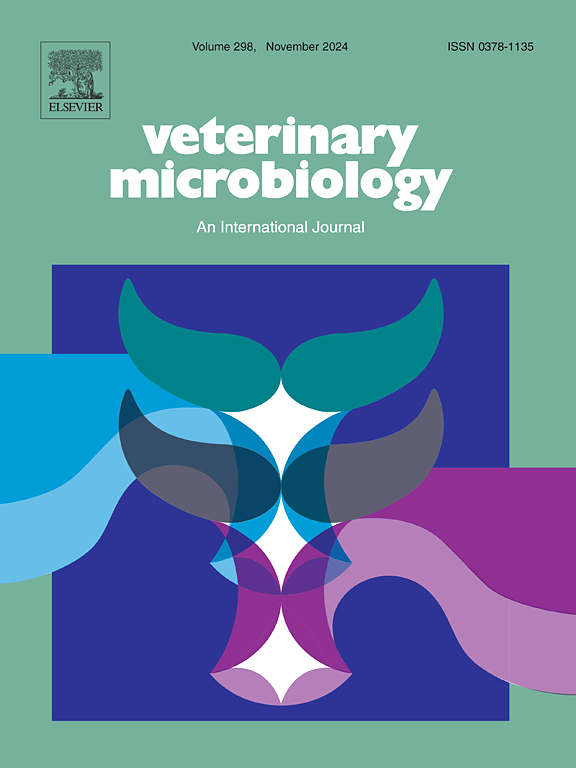Transcriptome profiling reveals that the host BRD4 protein facilitates African swine fever virus infection and suppresses inflammatory cytokine expression by downregulating transcriptional regulatory signaling pathways
IF 2.4
2区 农林科学
Q3 MICROBIOLOGY
引用次数: 0
Abstract
The African swine fever virus (ASFV), a complex DNA virus belonging to the Asfarviridae family, is a significant threat to the global swine industry because of its high mortality rates and impact on international trade. The establishment of a stable and efficient cell culture model of ASFV in vitro is helpful for the development of effective vaccines. Several passaged cell lines supporting ASFV replication have been reported to meet the scientific purpose of serial passage of ASFV to a certain extent, but it remains to be determined whether gene expression is lost or whether immunogenicity changes after serial passage of the virus. It is also unclear these edited cell lines how to affect ASFV replication. In our previous study, 3D4/21 cells were transduced with a lentivirus packaging system to express the BD1/2 domain of bromodomain-containing protein 4 (BRD4-BD1/2) and establish a 3D4/21-BD1/2 cell line, which efficiently increased ASFV replication. In this study, the role of bromodomain-containing protein 4 (BRD4), particularly its BD1/2 domains,in enhancing ASFV replication was investigated using an engineered 3D4/21 cell line. Through RNA-Seq transcriptomic analysis, we revealed that the host BRD4 protein facilitates ASFV infection and suppresses key transcription factors (CDK9 and p-CDK9) and inflammatory cytokine expression by downregulating transcriptional regulatory signaling pathways and suppressing innate immune responses. This dual mechanism of BRD4-BD1/2 in promoting ASFV immune evasion and adaptation underscores the virus’s strategic exploitation of host epigenetic factors. These findings provide valuable insights into viral pathogenesis and identify potential therapeutic targets, paving the way for future antiviral strategies.
转录组分析揭示宿主BRD4蛋白通过下调转录调控信号通路促进非洲猪瘟病毒感染并抑制炎症细胞因子的表达
非洲猪瘟病毒(ASFV)是一种复杂的DNA病毒,属于阿斯法病毒科,由于其高死亡率和国际贸易的影响,对全球养猪业构成重大威胁。建立稳定高效的ASFV体外细胞培养模型,有助于研制有效的ASFV疫苗。已经报道了几种支持ASFV复制的传代细胞系,在一定程度上满足了ASFV连续传代的科学目的,但在病毒连续传代后是否丢失了基因表达或是否改变了免疫原性仍有待确定。目前还不清楚这些编辑过的细胞系如何影响ASFV的复制。本研究利用慢病毒包装系统对3D4/21细胞进行转导,表达含溴结构域蛋白4 (BRD4-BD1/2)的BD1/2结构域,建立了3D4/21-BD1/2细胞系,有效地提高了ASFV的复制。在这项研究中,我们利用工程化的3D4/21细胞系研究了含溴结构域蛋白4 (BRD4),特别是它的BD1/2结构域,在增强ASFV复制中的作用。通过RNA-Seq转录组学分析,我们发现宿主BRD4蛋白通过下调转录调控信号通路和抑制先天免疫反应,促进ASFV感染并抑制关键转录因子(CDK9和p-CDK9)和炎症细胞因子的表达。BRD4-BD1/2在促进ASFV免疫逃避和适应中的双重机制强调了病毒对宿主表观遗传因素的战略性利用。这些发现为了解病毒的发病机制和确定潜在的治疗靶点提供了有价值的见解,为未来的抗病毒策略铺平了道路。
本文章由计算机程序翻译,如有差异,请以英文原文为准。
求助全文
约1分钟内获得全文
求助全文
来源期刊

Veterinary microbiology
农林科学-兽医学
CiteScore
5.90
自引率
6.10%
发文量
221
审稿时长
52 days
期刊介绍:
Veterinary Microbiology is concerned with microbial (bacterial, fungal, viral) diseases of domesticated vertebrate animals (livestock, companion animals, fur-bearing animals, game, poultry, fish) that supply food, other useful products or companionship. In addition, Microbial diseases of wild animals living in captivity, or as members of the feral fauna will also be considered if the infections are of interest because of their interrelation with humans (zoonoses) and/or domestic animals. Studies of antimicrobial resistance are also included, provided that the results represent a substantial advance in knowledge. Authors are strongly encouraged to read - prior to submission - the Editorials (''Scope or cope'' and ''Scope or cope II'') published previously in the journal. The Editors reserve the right to suggest submission to another journal for those papers which they feel would be more appropriate for consideration by that journal.
Original research papers of high quality and novelty on aspects of control, host response, molecular biology, pathogenesis, prevention, and treatment of microbial diseases of animals are published. Papers dealing primarily with immunology, epidemiology, molecular biology and antiviral or microbial agents will only be considered if they demonstrate a clear impact on a disease. Papers focusing solely on diagnostic techniques (such as another PCR protocol or ELISA) will not be published - focus should be on a microorganism and not on a particular technique. Papers only reporting microbial sequences, transcriptomics data, or proteomics data will not be considered unless the results represent a substantial advance in knowledge.
Drug trial papers will be considered if they have general application or significance. Papers on the identification of microorganisms will also be considered, but detailed taxonomic studies do not fall within the scope of the journal. Case reports will not be published, unless they have general application or contain novel aspects. Papers of geographically limited interest, which repeat what had been established elsewhere will not be considered. The readership of the journal is global.
 求助内容:
求助内容: 应助结果提醒方式:
应助结果提醒方式:


